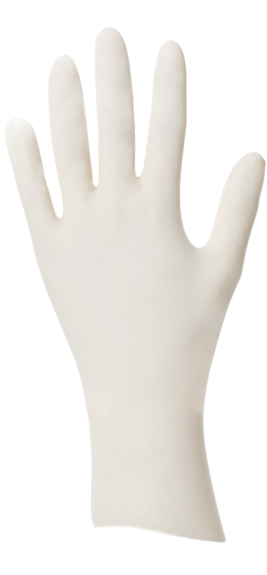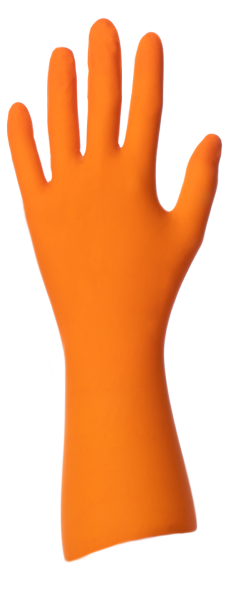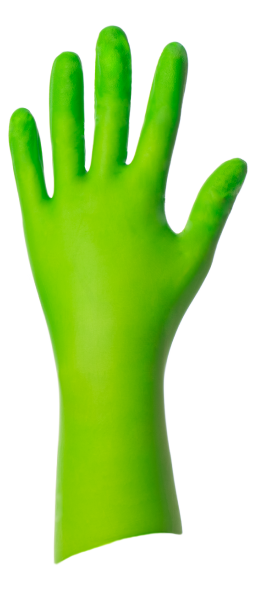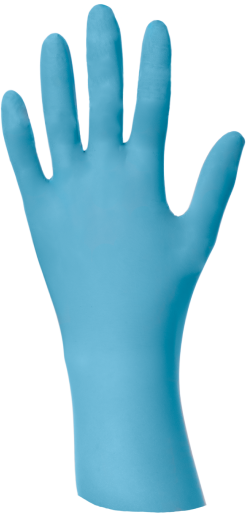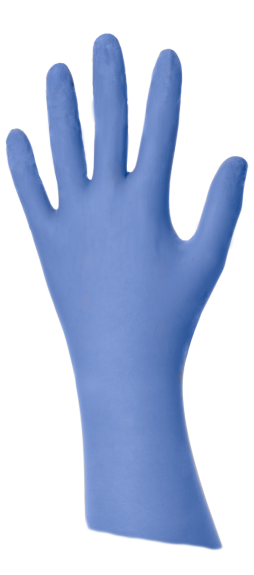Healthcare and Medical sector Gloves
In the medical fields, complying with stringent hygienic conditions is essential to protect patients and professionals against the cross-transmission of microorganisms (microbes, bacteria, ...) causing infections or diseases, or against contamination by viruses such as the Covid-19 coronavirus for example.
Therefore, the use of disposable gloves as a protective device is widespread in the health and healthcare context.
However, regulations governing gloves usage in the health sector differ depending on whether they are used to protect personnel or patients.
MEDICAL GLOVES: TWO USES, TWO REGULATIONS
Indeed, in a case the glove will be considered as a Personal Protective Equipment (PPE) while in the other case it will be considered as a Medical Device (MD). Some gloves are dual registered (as both a PPE and a DM) such as duoSHIELD™ gloves.
The main role of single-use gloves in the health sector is "protecting" but they fall under two different regulations depending on their use:
- Gloves to protect the wearers: these gloves are intended to protect medical personnel, nursing staff or paramedics against infectious, chemical, and physical risks, during their activities. In this context, disposable gloves are considered as PPE and therefore fall under Regulation (EU) 2016/425 and must also meet the requirements of ISO 21420:2020.
- Glove to protect the patients: these gloves are intended to protect the patients during the care procedures or during surgical interventions. These gloves are therefore considered as Medical Devices under Regulation (EU) 2017/745 and must also meet the requirements of EN 455-1/2/3/4.
Single-use gloves in the health fields are used both for direct contact with patients (invasive or non-invasive examination or care procedures) but also in the context of activities that do not involve direct contact with patients such as laboratories (medical analysis and anatomopathological), hospital pharmacies, cleaning, and disinfection services (CSSD – Centrale Sterile Service Department) for equipment and premises.
Wearing gloves should not reduce the importance for frequent hand washing, which is the first hygiene measure to be taken. In addition, gloves should be regularly changed (following an appropriate removal procedure to avoid hand soiling) and at least between each patient to avoid any risk of transmission of infectious or pathogenic agents.
GLOVES CATEGORIES
There are typically 2 types of gloves that are used in the health sector:
- Medical gloves or examination gloves: these are disposable ambidextrous gloves packed in dispensers and used for all acts involving caregivers and patients to avoid the risk of contamination. These are usually non-sterile gloves used for general applications.
- Surgical gloves: these are individually packaged sterile disposable gloves satisfying higher quality standards. They are often used in double-glove to prevent the risks associated with micro-holes appearance during their use.
Whatever the intended use, it is necessary to choose the gloves most adapted to the risks faced and presenting the required barrier qualities.
GLOVES MATERIALS
There are different materials used for the manufacturing of medical quality gloves. And thus, there is a large variety of gloves used in the health sector, but the main ones are:
- Latex gloves (natural rubber Latex): it is generally accepted that natural Latex gloves are very comfortable, very elastic. Latex gloves offer barrier and breaking strength properties adapted to the healthcare environment. However, they can cause Type I allergic reactions related to Latex proteins.
- Nitrile gloves (acrylonitrile-butadiene synthetic rubber gloves): Synthetic nitrile gloves provide a good level of comfort and dexterity. They also offer a high level of protection, particularly against microbiological risks and the risks associated with the use of chemicals. They are recommended for the preparation of cytotoxic chemotherapy drugs. In this context, however, it should be ensured that the gloves have been tested for the permeation of cancer chemotherapy drugs under conditions of continuous contact. In addition, wearing long-cuffed nitrile gloves provides additional protection for the wrist and forearm when handling dangerous chemicals. Nitrile synthetic gloves do not contain Latex protein and are hypoallergenic.
- Vinyl gloves: Polyvinyl chloride gloves are generally cheaper but offer very minimal comfort and protection. Indeed, their low elasticity and dexterity does not allow to perform gestures requiring great precision. In addition, their low level of resistance makes them vulnerable to mechanical stress.
There are also powdered and non-powdered gloves. The powder (cornstarch based) makes it easier to don the gloves by helping to slide the hand into the disposable glove. The powder also helps to limit perspiration, but it can cause allergies. An alternative to powder is chlorination (the gloves are immersed in chlorinated water and then rinsed).
Gloves used in the medical and health sectors come in different sizes, thicknesses, lengths and finishes. It is therefore necessary to be vigilant about the intended use to ensure the level of protection sought and choose the right glove for the correct use.
SHIELD Scientific offers a wide range of medical grade PPE gloves and cleanroom gloves adapted to the needs of hospital or clinic staff mainly for non-patient contact activities such as:
- Diagnostics and pathology laboratory technicians.
- Pharmacy technicians in hospital dedicated to the production of chemotherapy and other drugs for pediatric use, radiopharmaceuticals, parenteral nutrition, advanced therapy drugs.
- Sterile processing technician in central sterile services departments (CSSD) or sterile processing department (SPD).
- Bio-cleaning and disinfection staff in the surgical rooms.
- Etc …
SHIELD Scientific gloves meet or exceed the requirements of the healthcare sector in terms of comfort and protection against chemicals, microorganisms, and viruses.
Consult our glove selection guide or contact a SHIELD Scientific sales representative for more information or request glove samples.

